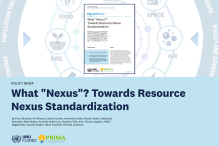During the last decades, there has been increasing interest around the world in monitoring, understanding, and addressing inequality, both within and between countries. Addressing inequality is not only a priority for normative reasons, but also given the implications it may have for economic growth and development, peace and stability, governance, and social cohesion. Reducing all types of inequality is now part of the agenda of governments, international organizations, and other international actors. The formulation of SDG 10 is an excellent expression of this, as well as the crucial role of reducing inequalities in achieving other SDGs.
This mission, however, still faces important challenges on the research side, particularly with respect to methodologies, cross-national comparability, and available data, especially for low-income countries and long-term analyses.
The World Income Inequality Database (WIID) enhances the available data on income inequality by presenting information for developed, developing, and transition countries. WIID has been hosted, maintained, and updated by UNU-WIDER since it was first released in September, 2000. It contains the most comprehensive set of income inequality statistics in the world and is part of UNU-WIDER’s ongoing contributions to understanding and mitigating global inequalities. These contributions include the world’s first estimates of global wealth inequality, advances in methodology, and major research projects on horizontal and vertical inequalities covering most of the world. The latest version of the WIID, released in May 2020, covers 200 countries (including historical entities), with over 11,000 data points in total. The WIID is a global public good, made freely available to anyone with the technology to download it.
Within the framework of the UNU-WIDER 2019-23 Work Programme, this project aims to contribute to the Institute’s ToC’s three interlinked outputs of creating, strengthening, and exchanging knowledge. The 2019-23 WIID project will 1) continue to update the WIID with the most recent inequality statistics, 2) take steps to ensure that the WIID continues to be a reliable tool for UN agencies, governments, multilaterals, and researchers, and 3) take new steps to increase the functionality and usability of the WIID for new users, including partners in media seeking to increase the profile of inequality as an issue, and 4) carry out exemplary research using the WIID that contributes to global knowledge on reducing inequalities in line with SDG10. This work aims to increase the uptake and dissemination of these contributions in global discourse, particularly within the UN system on the topic of inequality.
Upon the launch of the UNU-WIDER Work Programme 2019-2023 the research programme was divided into 6 flagship projects. Two years into the work programme these flagships have matured into several standalone projects, of which "WIID – World Income Inequality Database" originally under "Inequalities – measurement, implications, and influencing change " is one. As of 1 January 2021, this project has been included in Pelikan as its own entry.
- Focal Point
- Carlos Gradín



